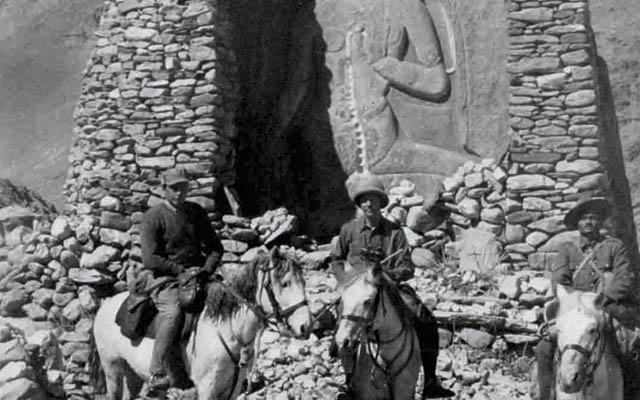The Secret War by Max Hastings
Guy Walters applauds a magisterial account of the world of intelligence that played such an important part in the Second World War.


The Secret War by Max Hastings (William Collins, £30 *£23)
It is impossible to quantify the number of books that have been written about the Second World War. A rough guide is provided by the website Amazon, which returns a figure of some 244,000 books if you search for ‘Second World War’, but this cannot be half of the actual figure.
So what are we to make of yet another hefty volume about the conflict? Is there really anything left to say? To paraphrase that cliché beloved of so many war movies, surely for us the war is over. Frankly, even to observe the potential staleness of the topic feels platitudinous.
Well, for Sir Max Hastings, the war is clearly far from over, as this latest work represents, by my reckoning, his eighth book on the subject. However, whereas his previous works were largely concerned with the military aspects of the war in the Western Hemisphere, this book takes a truly global approach to cover a comparatively little-explored aspect of the war: the world of intelligence.
As Sir Max acknowledges, some of The Secret War will be familiar to specialists, but for those whose appetites have been whetted by tales of wartime spooks by the likes of Ben Macintyre and Jason Webster, there is plenty of meat here to keep even the most war-jaded reader entertained.
His great strength is to use his formidable journalistic talents to bring alive a cast of characters who operated in the shadows and it is the mark of an author at the top of his game that he is able to keep a multiplicity of narratives running without causing confusion.
And what a cast it is, featuring the likes of womanising Soviet master spy Richard Sorge, British scientific and technical intelligence boffin R. V. Jones, the wily head of the SS foreign intelligence service Walter Schellenberg and the larger-than-life founder of the forerunner of the CIA, William ‘Wild Bill’ Donovan.
Sign up for the Country Life Newsletter
Exquisite houses, the beauty of Nature, and how to get the most from your life, straight to your inbox.
However, The Secret War is far more than a collection of portraits; it is a full and frank assessment of how much the work of such men contributed to the outcome of the war. Sir Max acknowledges ingenuity, cunning and bravery, but he isn’t convinced that intelligence services are quite the all-knowing, all-seeing organisations that the spooks would like us to believe.
Furthermore, he is cynical about the efficacy of guerrilla units, especially the Special Operations Executive (SOE), about which he has been damning before.
One major theme that developed is the wartime rise of what intelligence historians call ‘Sigint’— signals intelligence information gleaned from intercepting radio traffic. At the start of the war, there was an emphasis on relying on ‘humint’ human intelligence or, in plain words, spies and agents.
Of course, the major breakthrough during the war was the cracking of the Germans’ Enigma machine at Bletchley Park. Great claims are usually made for this and we often hear that Bletchley shortened the war by ‘years’. Sir Max is more cautious and encourages us to think more like Churchill himself, who was wary of isolating any one element of the war as being uniquely fundamental. ‘All things are always on the move simultaneously,’ the great man said.
The author would be the first to acknowledge that this is not a comprehensive history of all the hidden stories behind the war. That would take a book about five times as long and, besides, there already exists the late Sir Harry Hinsley’s magisterial multi-volume British Intelligence in the Second World War. Sir Max’s examination is broader and global, so it is obviously less detailed than that of Hinsley.
As a result, there are lacunae, not least that of the organisation MI9, which he merely ascribes as an escape organisation for British prisoners of war. In fact, it was also a vital intelligence-gathering machine and it seems a shame that its role has been overlooked here.
This is perhaps a niggle for the specialist and, hopefully, a full history of MI9 will be published one day yet another book about the war! But, for those who want to look beyond and behind the chaps with maps, The Secret War is a worthy addition to those other 244,000 titles.
To order any of the books reviewed or any other book in print, at discount prices* and with free p&p to UK addresses, telephone the Country Life Bookshop on 0843 060 0023 or visit www.countrylife.co.uk/bookshop. Or send a cheque/postal order to the Country Life Bookshop, PO Box 60, Helston TR13 0TP. For overseas readers, telephone 01326 569444 or email sales@sparkledirect.co.uk *See individual reviews for CL Bookshop price.
Country Life is unlike any other magazine: the only glossy weekly on the newsstand and the only magazine that has been guest-edited by HRH The King not once, but twice. It is a celebration of modern rural life and all its diverse joys and pleasures — that was first published in Queen Victoria's Diamond Jubilee year. Our eclectic mixture of witty and informative content — from the most up-to-date property news and commentary and a coveted glimpse inside some of the UK's best houses and gardens, to gardening, the arts and interior design, written by experts in their field — still cannot be found in print or online, anywhere else.
-
 Six rural properties with space, charm and endless views, as seen in Country Life
Six rural properties with space, charm and endless views, as seen in Country LifeWe take a look at some of the best houses to come to the market via Country Life in the past week.
By Toby Keel
-
 Exploring the countryside is essential for our wellbeing, but Right to Roam is going backwards
Exploring the countryside is essential for our wellbeing, but Right to Roam is going backwardsCampaigners in England often point to Scotland as an example of how brilliantly Right to Roam works, but it's not all it's cracked up to be, says Patrick Galbraith.
By Patrick Galbraith